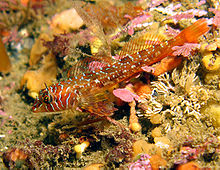Jordaniidae
| Jordaniidae | |
|---|---|

| |
| Jordania zonope | |
| Scientific classification | |
| Domain: | Eukaryota |
| Kingdom: | Animalia |
| Phylum: | Chordata |
| Class: | Actinopterygii |
| Order: | Perciformes |
| Suborder: | Cottoidei |
| Family: | Jordaniidae Jordan & Evermann, 1898[1] |
| Genera | |
|
see text | |
Jordaniidae is a small family of marine ray-finned fishes belonging to the order Perciformes. These fishes are found in the eastern North Pacific Ocean.
Taxonomy
Jordaniidae was first proposed as a subfamily, Jordaniinae, of the family Cottidae in 1898 by the American ichthyologists David Starr Jordan and Barton Warren Evermann.[1] The 5th edition of Fishes of the World classifies this family within the superfamily Cottoidea, in the suborder Cottoidei of the Scorpaeniformes.[2] Other authorities classify this family within the infraorder Cottales within the order Perciformes, as they suggest that Perciformes is paraphyletic if the Scorpaneiformes are excluded from it.[3] The cabezon (Scorpaenichthys marmoratus) is classified within the Jordaniidae by some authorities[4] but the 5th edition of Fishes of the World classifies this species in the monotypic family Scorpaenichthyidae.[2] This family is regarded as one of the more basal members of the Cottoidea grouping.[5]
Etymology
Jordaniidae takes its name from its type genus, Jordania, which was named by Edwin Chapin Starks in 1895 and Stark's' name honours David Starr Jordan who was his "teacher in ichthyology".[6]
Genera and species
Jordaniidae contains two monotypic genera:[2][4]
- Genus Jordania Starks, 1895
- Jordania zonope Starks, 1895 (Longfin sculpin)
- Genus Paricelinus C. H. Eigenmann & R. S. Eigenmann, 1889
- Paricelinus hopliticus C.H. Eigenmann R.S. Eigenmann, 1889 (Thornback sculpin)
Characteristics
Jordaniidae sculpins have a single pharyngobranchial on the gill arch, 5 finrays in the pelvic fin a long body with a long based anal fin, 2 separate dorsal fins and reduced gills.[2] These fishes reach a maximum published total length of 15 to 20 cm (5.9 to 7.9 in).[7][8]
Distribution and habitat
Jordaniidae sculpins are found in the eastern Pacific Ocean from Alaska to California. They are demersal fish found from the intertidal zone to 138 m (453 ft) in rocky areas.[8]
References
- ^ a b Richard van der Laan; William N. Eschmeyer & Ronald Fricke (2014). "Family-group names of Recent fishes". Zootaxa. 3882 (2): 001–230. doi:10.11646/zootaxa.3882.1.1. PMID 25543675.
- ^ a b c d J. S. Nelson; T. C. Grande; M. V. H. Wilson (2016). Fishes of the World (5th ed.). Wiley. pp. 467–495. ISBN 978-1-118-34233-6. Archived from the original on 2019-04-08. Retrieved 2022-12-15.
- ^ Ricardo Betancur-R; Edward O. Wiley; Gloria Arratia; et al. (2017). "Phylogenetic classification of bony fishes". BMC Evolutionary Biology. 17 (162): 162. Bibcode:2017BMCEE..17..162B. doi:10.1186/s12862-017-0958-3. PMC 5501477. PMID 28683774.
- ^ a b Eschmeyer, William N.; Fricke, Ron & van der Laan, Richard (eds.). "Genera in the family Jordaniidae". Catalog of Fishes. California Academy of Sciences. Retrieved 15 December 2022.
- ^ W. Leo Smith & Morgan S. Busby (2014). "Phylogeny and taxonomy of sculpins, sandfishes, and snailfishes (Perciformes: Cottoidei) with comments on the phylogenetic significance of their early-life-history specializations". Molecular Phylogenetics and Evolution. 79: 332–352. Bibcode:2014MolPE..79..332S. doi:10.1016/j.ympev.2014.06.028.
- ^ Christopher Scharpf & Kenneth J. Lazara, eds. (11 July 2021). "Order Perciformes: Suborder Cottoidea: Infraorder Cottales: Families Trichodontidae, Jordaniidae, Rhamphocottidae, Scorpaenichthyidae and Agonidae". The ETYFish Project Fish Name Etymology Database. Christopher Scharpf and Kenneth J. Lazara. Retrieved 16 December 2022.
- ^ Froese, Rainer; Pauly, Daniel (eds.). "Jordania zonope". FishBase. August 2022 version.
- ^ a b Froese, Rainer; Pauly, Daniel (eds.). "Paricelinus hopliticus". FishBase. August 2022 version.
